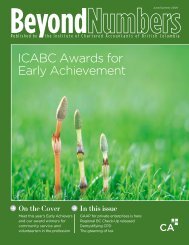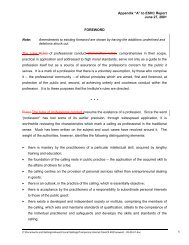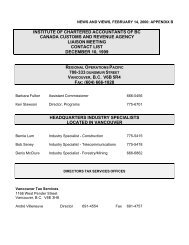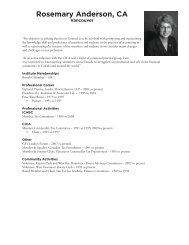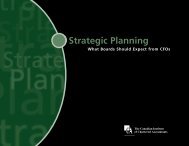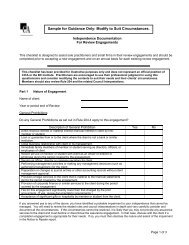CICA 20 QUESTIONS Strategy - Institute of Chartered Accountants ...
CICA 20 QUESTIONS Strategy - Institute of Chartered Accountants ...
CICA 20 QUESTIONS Strategy - Institute of Chartered Accountants ...
- No tags were found...
You also want an ePaper? Increase the reach of your titles
YUMPU automatically turns print PDFs into web optimized ePapers that Google loves.
These risks should be spelled out in the strategic plan.And, directorsshould approve only those strategies where the associated risks - andtheir impact - are deemed to be tolerable given the potential for return.The Board should also be assured that the organization has put in placea risk management system for measuring and monitoring known risks,estimating their impact, mitigating their occurrence or effect (e.g.,through insurance, hedging, codes <strong>of</strong> conduct or assigned riskmanagers), and identifying emerging dangers.A more comprehensive discussion <strong>of</strong> current risk managementpractices is contained in a companion publication <strong>of</strong> the <strong>CICA</strong> called<strong>20</strong> Questions Directors Should Ask About Risk. Directors shouldfamiliarize themselves with these questions as well.Monitoring Progress19. Are appropriate mechanisms in place to provide theBoard with timely feedback on the organization’s progressagainst its strategy, the underlying causes <strong>of</strong> anyperformance variance and any changes in theinternal/external environments or risk factors whichwould cause the Board to consider altering theorganization’s strategy?In fulfilling their strategic and governance responsibilities, it isincumbent upon directors to monitor the organization’s progressagainst its strategic objectives and related risk factors. Consequently,directors need to ensure that their organization’s progress against each<strong>of</strong> its strategic objectives (along with an update on any significantbusiness risks) be reviewed at each meeting <strong>of</strong> the full Board.A Word About ‘Constructive Involvement’and Who Does WhatAccording to the OECD:"Corporate governance is the system by which business corporationsare directed and controlled.The corporate governance structurespecifies the distribution <strong>of</strong> rights and responsibilities among differentparticipants in the corporation, such as, the Board, managers,shareholders and other stakeholders, and spells out the rules andprocedures for making decisions on corporate affairs." April 1999.Today, the responsibility to actively participate in the development andapproval <strong>of</strong> the overall strategy, to monitor the strategy’s progress, andto oversee and guide the organisation represents some <strong>of</strong> thequintessential activities <strong>of</strong> corporate governance.And that responsibility,today, is seen to reside principally with the Board.As Boards take on their new tasks and duties in this area, there is goingto be a shift in both the role and manner in which they interact withmanagement – especially the CEO. Unfortunately, many seniorexecutives will see the Board’s new strategic responsibilities asincursions into decision areas that were once strictly within the domain<strong>of</strong> the executive suite. But, times have changed.And astute Boards willrecognize – and anticipate - the potential resistance that they mayencounter from senior managers as they attempt to become moreinvolved participants in their organization’s strategic decision making.Indeed, they have no choice. Boards must now participate in, assess andapprove the strategy. (Appendix 1 lays out one framework in which theresponsibilities for the organization’s strategy and strategic planning aredivided between the Board and Senior Management.) But, it is in noone’s best interests if the relationship between the Board and seniormanagement is adversarial – especially when it comes to plotting theorganization’s future direction.10



